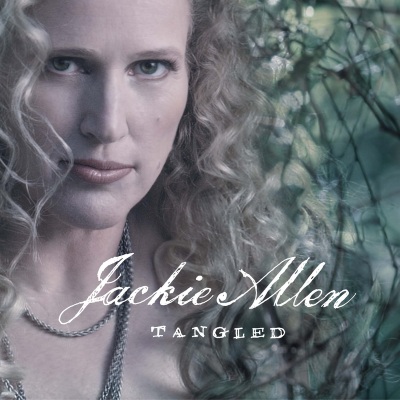
Tangled
by Thom JurekOn her Blue Note debut (and eighth recording overall), vocalist Jackie Allen stretches her already crossover approach to where the seams show. Thank God. She is a fine jazz singer and has a way with ballads and standards that is her own to be sure -- and she records a couple of them here -- but her gift with more pop-oriented material is utterly distinctive and even innovative, since there isn't another singer out there who phrases like her. Tangled was produced with great taste by Eric Hochberg -- who also chaired her last session, Love Is Blue, and has played bass with everyone from the jazz stalwart Kurt Elling to one of the greatest crossover folk and jazz singers in history, the great Terry Callier. The set has a few standards, like Rodgers & Hart's "You're Nearer" and "Everything I've Got Belongs to You." But the standards on this program are -- heresy of heresies -- the very things that hold it back from being a pop masterpiece. She has proven over and over again that she can sing standards and ballads with the best of them. But her treatment of Van Morrison's "When Will I Ever Learn," which opens the album, is a wake-up call even to her many fans. It's revelatory and sounds effortless. It's a revealing and poignant treatment of one of Morrison's most overtly spiritual songs and most difficult to grasp hold of. Likewise, her read of her guitarist John Moulder and bassist Hans Sturm's "Cold Gray Eyes" brings Celtic, rock, and blues influences to bear in a dramatic, tough, and deeply emotive performance. Her own Brazilian-flavored "If I Had" is lightweight samba jazz in the verse, but the refrains are gorgeous. The title cut is full of beautiful electric guitars creating a nocturnal tension that is deceptively noir-ish. This is the kind of torn love ballad that expresses through the grain in her voice what the words -- though burningly direct -- can't begin to get to. The funky "Slip" is also an original that struts and slides with a tough groove. Her reading of Donald Fagen's "Do Wrong Shoes" jazzes up a tune in high-camp style that had a tougher edge as a pop-jazz number. The bookend track, Randy Newman's "Living Without You," is another argument for Allen's pop phrasing. She gets the underlying country-soul in Newman's song, and the sheer emotion that needs to be expressed in its lyric doesn't lend itself to the studied dramatic sentimentality in many torch songs and standards -- especially as they are sung in this day and age (usually by up-and-comers trying to prove their mettle before they have the chops, or by veterans whose careers are devoid of imagination or discipline and fall back on the most difficult material to try to gain a few more miles from the empty tank). It may take another record or so -- or a bona fide adult alternative "hit" selected by a radio programmer with some vision -- to convince Allen to go the direction she could go effortlessly and win herself a slew of new fans.
